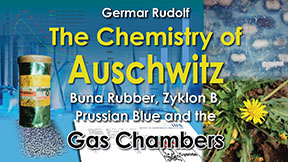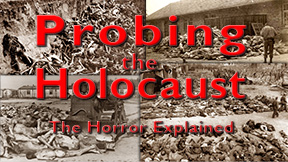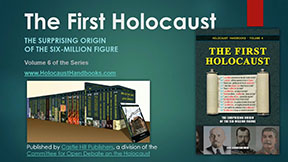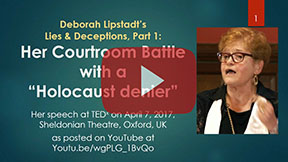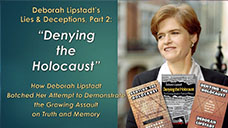This Interview was conducted in 1993 by U.S. revisionist Friedrich Paul Berg after Rudolf’s expert report had caused a stir in Germany.
Interview with Germar Rudolf by Friedrich Paul Berg, early Fall 1993
Berg: Mr. Rudolf, recently your “Expert Report on the Formation and Detectability of Cyanide Compounds in the ‘Gas Chambers’ of Auschwitz” has caused a furore behind the curtains. How did it happen that you as a member of the younger generation produced this report?
Rudolf: About 1984, at the beginning of my chemistry studies, I was given a book by Armin Mohler on the suppression of history in Germany, based on a semi-official study. This book intrigued me so much that in 1989, shortly before I completed my Diplom studies, I got the expanded second edition. In this book it was stated that an American technical expert had prepared an expert report on the gas chambers of Auschwitz in which he concluded that these rooms had never been used for mass murder. He supported this conclusion by pointing out, for one thing, that there were hardly any traces of cyanide in the gas chambers, whereas there were high concentrations of it in the clothing delousing chambers. After I had read this book, I felt as though I had been hit over the head. One thing was certain: either this American was a charlatan or my whole worldview was untrue. The first thing I had to do to decide this question was to get a copy of this expert paper and read it. That was the beginning of my work.
Berg: Did the Leuchter Report convince you?
Rudolf: No, not at all. He raised more questions than he was able to answer. For example, in Spring 1990 in the journal Jungen Freiheit, Prof. Nolte had pointed out that it was possible that cyanide would be destroyed by the weather. The Leuchter Report did not discuss clearly what the condition of the supposed gas chambers was, how stable the traces of cyanide — that is, cyanide compounds — were, or whether they would even have formed during the claimed gassings of humans. At the time I had posed these questions in a letter to the Jungen Freiheitand decided that I would set myself the task of answering these doubts, on which hung the life and death of a whole worldview.
Berg: Was not your decision influenced by the request of a constitutional attorney who wanted to have an expert report to use in court?
Rudolf: No. The first outside reaction I got was a response to the above-mentioned letter to the journal. In February 1991, I received from an unknown person a list of addresses of persons and institutions who might be interested in my research and in whatever results might come from it. At that time, shortly after beginning my doctoral work, I used my spare time to assemble data from technical publications which I hoped to be able to use to answer the questions I mentioned before.
Berg: When did the constitutional attorney approach you?
Rudolf: That was in Summer 1991. By that time I had worked through the chemical fundamentals of the problem and had sent the information to parties I thought might be interested ….
Berg: Does that include the Institute for Contemporary History?
Rudolf: Yes, them also, but they never responded. Constitutional attorney Hajo Herrmann, who defended General-major Remer against the Holocaust-denial charge, contacted me in July 1991 to ask if I would be willing to write an expert report. I decided to make an exploratory trip to Auschwitz, to take samples, to evaluate them and to prepare an expert report from that.
Berg: Now you have aroused considerable irritation in professional circles because of your expert report. When did your employer, the Max Planck Institute for Solid State Research in Stuttgart, first learn about your spare-time efforts?
Rudolf: That must have been a month or so after the trip to Poland. If the police had not seized my papers, I could give you the exact date. It was probably September 1991. I had written the Chief Editor of the leading German chemical journal, the Angewandte, to ask if I could publish my research results, which I described briefly, in his journal. When he called back about it, I was absent by chance and the call was taken by Prof. Simon, a colleague of my doctoral supervisor Prof. von Schnering. Prof. Simon was disturbed by the subject matter. But the situation quieted down when he learned from my doctoral supervisor, who was the Executive Director of the Institute at the time, that this research was not related to my doctoral research.
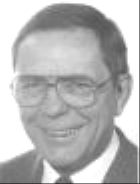
Prof.Dr.Dr.h.c. Hans Georg von Schnering, 1990
Berg: They had no objection to your spare-time endeavors?
Rudolf: At that time my research was not completed to the point where I was willing to make any hard and fast conclusions. So I did not pronounce any conclusions and thus avoided any direct confrontation. I think my doctoral supervisor did not fully understand the danger, because I had been very cautious in my statements, whether written or spoken.
Berg: And what happened once you became certain of your results?
Rudolf: An associate told me I should lay my cards on the table before my doctoral supervisor, otherwise, the longer I waited to do so, the worse the situation would be when the work became publicly known. I took advantage of a conversation on the Holocaust that a fellow student had had with my doctoral supervisor. In April 1992 I sat down and wrote a private letter to Prof. von Schnering explaining my view of things.
Berg: How did he react to it?
Rudolf: He was very angry. The morning after he received my letter he stormed into my office, threw the book NS-Massentötungen durch Giftgas (Nazi Mass Murder by Poison Gas) by E. Kogon and others, onto my desk, demanded that I read it so that I would stop my crazy talk, and warned me that my letter would have consequences.
Berg: Did it have consequences?
Rudolf: Well, as he stood in the door ready to leave, I handed the book back to him and told him that I knew the book, that I had it and had already read it. Right away I wrote him another letter in which I explained my opinion of the book he had offered me. The two main points were: First, the authors of the book maligned anyone who might have a different viewpoint in vicious terms, but without naming names. Therefore, one could not decide if the abuse was justified. Second, they accused anyone with a different viewpoint of evil intentions and unscientific method, but here again gave no sources which one could use to evaluate the claims. It must be a sorry fellow who would give such a book to me as a researcher and expect me to be convinced by it, a book which attacked and put beyond consideration any contrary viewpoint and intentionally did not give the reader the means to evaluate the charges. Naturally, in my letter I put this more diplomatically, but I made my case quite clearly. For some time after that I did not hear anything from my doctoral supervisor on the subject.
Berg: But the subject came up for discussion again.
Rudolf: I would have let things ride. But an acquaintance who was a doctoral level professional chemist and about the same age as Prof. von Schnering, told me he would try to alleviate the situation between us by a personal conversation. The conversation took place — it was in June 1992, I believe. At that time my acquaintance gave my doctoral supervisor my expert report, with the request that he examine it, and he later also sent the latter a book which he recommended in order to get him to consider the arguments of the other side, following the scientific maxim audiatur et altera pars (let the other side be heard).
Berg: What was the reaction of your doctoral supervisor to that?
Rudolf: He sent the book back a little while later, unopened, or so my acquaintance told me.
Berg: In other words, he had no interest in hearing the arguments of the other side. Was not that behaviour a massive offense against the fundamental principle of science you have just mentioned?
Rudolf: I do not believe that that Prof. von Schnering considers this subject area a question for science. He did not consider himself technically qualified to address the issue and refused to listen to any argument which he could not evaluate, which in any case were claimed to be false by historians he knew and trusted.
Berg: How did he react to your expert report?
Rudolf: This question is much more interesting. In addition to a few side issues which did not concern my expert report, in August 1992 he attacked me for two points which I will explain here.
- I briefly mentioned in my expert report that it would have been impossible to kill people in massive numbers with exhaust from diesel motors taken from captured Russian armor. As support for this I used arguments from an article that you, Mr. Berg, published 10 years ago in Journal of Historical Review. Dr. von Schnering objected that the Russians could not have used diesel motors in their armor, because diesel fuel would have congealed or hardened in the Russian winters. It was therefore irrelevant to speculate on the killing capability of diesel motors. Moreover, my useless conclusion on this subject showed that I was blind to any argument that would contradict my thesis.
- Prof. von Schnering also claimed that the analysis of masonry samples was nonsensical unless it could be shown that the victims had not inhaled all the Prussic acid. One could only interpret the analytic data properly after having determined how much Prussic acid was left in the air after a gassing.
Since these considerations had not appeared in my expert report, my doctoral supervisor concluded that I was apparently blind to or ignored any contrary arguments. It should be understandable when people seek to make the horrible events of the past disappear. It should also be understandable when the present generation can not believe the incomprehensible events of the past and therefore may want to deny them. However, for me as a scientist to begin to pronounce wish-conclusions would be grossly unscientific and would show that I was unfit for an academic degree. For that reason, he advised me to break off any effort in this direction. He closed with the remark that he would burn my expert report if that would make it disappear from the world.
Berg: In the fine tradition of book-burning.
Rudolf: That’s what it looks like.
Berg: Do you have the desire to make these real or supposed past events not to have happened?
Rudolf: I think only abnormal Jew-haters wish that a mass murder of Jews had taken place, and I do not hate Jews. But one can not unmake the past, so the question is useless. A better question would be, does the present generation consider the Holocaust to be so incomprehensible that it wants to deny it. On the contrary, the fact is that every German is fed Holocaust history with his mother’s milk and the public has no doubt of the truth of the story. The Holocaust is one of the absolutes in the consciousness of every German and so it was with me before 1989. There is one incomprehensible thing to the average German, and that is that the Holocaust is a lie. The answer to the question is that the situation is exactly the reverse: It is not the Holocaust that is incomprehensible. We have long since come to live in peaceful coexistence with it. What would be incomprehensible would be for the polar star of our worldview, the Holocaust, to suddenly turn out to be a shooting star. This goes especially for intellectuals such as Prof. von Schnering, who think they are quite clever and who would suffer a horrendous crack-up if they were to have to acknowledge that they believed in a lie. The danger is that these intellectuals, due to their mental unflexibility, will want to defend their accustomed, comfortable worldview against all attacks. More than anything else, they do not want to allow a revolution in their worldview. They achieve their desired result by blindness to any arguments contrary to the Holocaust.
Berg: Back to the main question. To what extent were Prof. von Schnering’s objections valid?
Rudolf: They were cogent objections. I promised Prof. von Schnering to consider the matter further. After this conversation I spent a sleepless night. I put myself back at square one and tried to resolve the questions. I determined as follows:
- The Russians had used diesel motors in all their heavy armor. It is not hard to show this, since both contemporary documentation and current specialist publications are full of specifications of World War 2 Soviet weapons.
- The question whether the supposed gassing victims had inhaled all the Prussic acid had been made to Prof. von Schnering already in November 1991 by G. Wellers. This scenario has two prerequisites:
- the Zyklon B must release the poison very rapidly, and
- the victims must live until their lungs have filtered the air in the gas chamber nearly to purity.
Neither prerequisite was met. Even at room temperature Zyklon B takes over two hours to release the poison. But according to the witness testimony, the victims died within a few minutes. That means, for one thing, that large quantities of Zyklon B would have been needed to ensure a quick death, and, for another, that in that short time span the victims would not have been able to purify the ambient air, or to have inhaled all the poison from the Zyklon B.
Berg: In other words, your doctoral supervisor’s counter-arguments collapsed on closer examination?
Rudolf: That is so. And there is more: With respect to the motors in Soviet armor, apparently my doctoral supervisor had not taken the trouble to find out what the facts were. He had proposed a thesis which had no foundation because it allowed him to keep his worldview from being called into question. In other words, he had ignored possible counter-arguments in order to protect his desired version of things.
The Prussic acid question is different. Here he had not, like G. Wellers, raised the possibility that the victims had inhaled all the Prussic acid, rather he had only asserted that one needed to positively exclude this in order to draw sound conclusions.
Berg: How did he react to your better arguments?
Rudolf: At first I did not tell him, because I knew that any further pursuit of the issue would only end in disaster. Throughout the whole discussion, Prof. von Schnering had shown that he was not willing to consider arguments that contradicted his worldview. I decided it was better to let grass grow on the matter for a while. Towards the end of 1992 I was in the midst of completing my doctoral dissertation. I needed to focus my energy on other things. However, I put in my desk evidence that supported my theses from authors such as Fritz Berg and John Ball and from the Polish Historical Society, in case the subject should arise again.
Berg: Was it the unauthorized distribution of the expert report by General-major Remer in April 1993 that brought it to light again?
Rudolf: Yes, and in a way that was disastrous for me.
Berg: Did you discuss the contents of your expert report during this affair?
Rudolf: My doctoral supervisor threw at me the same arguments he had used in August 1992, including the diesel motor business. I told him right off that he was wrong and that I would give him proof, which I kept in my desk. He cut me off with the remark that that did not interest him. At that point I sent him a letter with the proofs by registered mail, which caused him to go into a rage when he received it. In the presence of Prof. Simon, the recently chosen Executive Director of the Max Planck Institute, he said that it was impudent to send him documents that he did not want by registered mail since he could not refuse delivery. He threw the opened package at me and said he would keep the enclosed letter as evidence, but that wild horses could not make him acknowledge the existence of the documentation. Then I asked him whether he was a dogmatist or a natural scientist. He did not want to discuss that.
Berg: Your doctoral supervisor’s behaviour, his hysterical refusal to consider potentially contrary arguments, even to the point of refusing to acknowledge their existence, his uncontrolled and partially unfounded production of wish-conclusions are all characteristics which would mark him as unworthy to hold an academic degree, according to his own principles. Should not he now be required to surrender his teaching position and doctor’s degree?
Rudolf: If he expects the qualifications that he applies to others to apply to himself, then yes. If they were applied as a general rule, I am afraid there would not be any academics left in Germany. That would be a poor fix for our present glut of academics.
Berg: Did they ask you to distance yourself from your expert report?
Rudolf: Astonishingly, no. They only asked me to distance myself from Remer’s operation as well as from Remer’s version, on account of the accompanying commentary. When I asked if this meant that I should distance myself from the content of the expert report, Prof. Simon expressly said not.
Berg: Would you have done it if asked?
Rudolf: Never for a moment. When somebody brings me convincing arguments that cause me to reconsider, then I may be ready to change my opinion. People who use force against me will never change my mind.
Berg: Is this all that any professor could come up with?
Rudolf: No. Shortly afterward, in a private conversation Prof. Simon apologized for the impossible behaviour of my doctoral supervisor. He showed some understanding for the fact that a member of the younger generation should attempt to study the Holocaust problem without preconceptions. He also said that there was in principle nothing to object to in my expert report, with two exceptions. First, I should not put quote marks around the words “gas chamber”, as I had done throughout the expert report. This signified that I had written the expert report with preconceived ideas, because the quote marks themselves indicated a doubt. Second, I should not come to such far-reaching conclusions only on the basis of witness testimony, because I should know from my own experience how unreliable witness statements were.
Berg: What was your answer to him about that?
Rudolf: Well, whoever has read my expert report would know that before the development of the Holocaust the term Gaskammer (gas chamber) was a technical term for a delousing chamber for clothing and personal effects. Since I also discussed these things in my expert report, it is easy to see that people might get confused. For that reason, I put a list of definitions of terms in a chapter at the beginning of the expert report, in which Menschengaskammer, (homicidal gas chamber), the term in common usage, was put in quotation marks in order to distinguish it from the technical term Gaskammer for delousing gas chamber.
Finally, one should recognize, although I did not make this point to Prof. Simon, that acceptance of the existence of the homicidal gas chambers is no less a preconception than the opposite belief. That it is nowadays taken for granted does not alter the fact that it is a preconceived notion. Moreover, just as it is a tradition of the rule of law that in a criminal trial one should assume that the accused is innocent until it is proven otherwise, so also should the object being studied first be labelled the murder weapon “gas chamber” without quote marks when the fact has been proven. If I had assumed the fact of the crime and the weapon used in the crime as given beforehand, this would mean that the proof of the crime had already been shown and that no investigation was necessary. There would be no need for an expert report.
Here also the reality has been reversed: Whoever writes the term Gaskammer (gas chamber), meaning Menschengaskammer (homicidal gas chamber), without quotes from the beginning of a scientific study, undermines not only the correct meaning of technical terms but also our principles of the rule of law.
Berg: What can be said against the argument that witness testimony is weak evidence to use in the preparation of an expert report?
Rudolf: As to Prof. Simon’s assertion on the unreliability of witness testimony, I answered with one word: Truly.
It is amazing for a Professor to refuse to accept witness testimony as exonerating evidence when at the same time he will accept the same unreliable witness testimony silently and without protest which has had the effect that hundreds of people have been sentenced to death and thousands to long terms of imprisonment, that an entire people has been stripped of its rights and a whole nation held in persecution and oppression. Prof. Simon does not fully understand how unreliable witness testimony is. He thinks there will be incorrect details here and there, such as with those few I used in my expert report. But they can be wrong, or fraudulent, to a degree that one can only recognize when one takes his blinders off and reads the original documents with a critical eye. But how can I convey this to Professor Simon, who refuses, for example, to accept the Ernst Gauss book Vorlesungen über Zeitgeschichte from me as a gift? Prof. Simon is another one of those who bars the door against unwanted arguments.
Berg: Are the words authentic that you attribute to Prof. Simon and that you print on the second cover page of your expert report, to the effect that German researchers should not touch the taboo on the gassing of the Jews and that Germans have lesser rights than other peoples and should learn to accept that?
Rudolf: These statements, which represent an intellectual bankruptcy without parallel, occurred in the same conversation mentioned above. They are not literal quotes, but are taken from a protocol of the conversation I wrote from memory the same evening. These quotes are true to the meaning that he expressed.
Berg: Do you know if there has been any discussion on the matter in the meantime among chemists in Germany?
Rudolf: Not to my knowledge. I received a reaction from a person I knew at Hoechst AG which was characteristic. He protested against any further sending of unwanted material because this kind of discussion had been forbidden by the Federal High Court. There was apparently no scientific counter-argument to be made, or at least none was attempted. Everyone hides behind the penal code, which protects us — thank God! — from having to think!
Berg: I thank you for this conversation.


